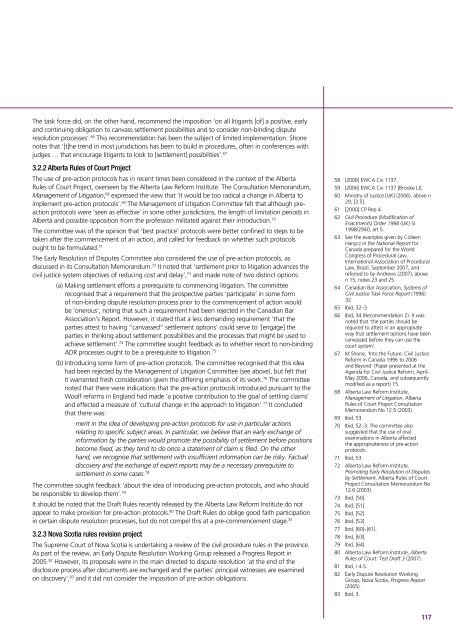Facilitating the Early Resolution of Disputes without Litigation
Facilitating the Early Resolution of Disputes without Litigation
Facilitating the Early Resolution of Disputes without Litigation
You also want an ePaper? Increase the reach of your titles
YUMPU automatically turns print PDFs into web optimized ePapers that Google loves.
The task force did, on <strong>the</strong> o<strong>the</strong>r hand, recommend <strong>the</strong> imposition ‘on all litigants [<strong>of</strong>] a positive, earlyand continuing obligation to canvass settlement possibilities and to consider non-binding disputeresolution processes’. 66 This recommendation has been <strong>the</strong> subject <strong>of</strong> limited implementation. Shonenotes that ‘[t]he trend in most jurisdictions has been to build in procedures, <strong>of</strong>ten in conferences withjudges … that encourage litigants to look to [settlement] possibilities’. 673.2.2 Alberta Rules <strong>of</strong> Court ProjectThe use <strong>of</strong> pre-action protocols has in recent times been considered in <strong>the</strong> context <strong>of</strong> <strong>the</strong> AlbertaRules <strong>of</strong> Court Project, overseen by <strong>the</strong> Alberta Law Reform Institute. The Consultation Memorandum,Management <strong>of</strong> <strong>Litigation</strong>, 68 expressed <strong>the</strong> view that ‘it would be too radical a change in Alberta toimplement pre-action protocols’. 69 The Management <strong>of</strong> <strong>Litigation</strong> Committee felt that although preactionprotocols were ‘seen as effective’ in some o<strong>the</strong>r jurisdictions, <strong>the</strong> length <strong>of</strong> limitation periods inAlberta and possible opposition from <strong>the</strong> pr<strong>of</strong>ession militated against <strong>the</strong>ir introduction. 70The committee was <strong>of</strong> <strong>the</strong> opinion that ‘best practice’ protocols were better confined to steps to betaken after <strong>the</strong> commencement <strong>of</strong> an action, and called for feedback on whe<strong>the</strong>r such protocolsought to be formulated. 71The <strong>Early</strong> <strong>Resolution</strong> <strong>of</strong> <strong>Disputes</strong> Committee also considered <strong>the</strong> use <strong>of</strong> pre-action protocols, asdiscussed in its Consultation Memorandum. 72 It noted that ‘settlement prior to litigation advances <strong>the</strong>civil justice system objectives <strong>of</strong> reducing cost and delay’, 73 and made note <strong>of</strong> two distinct options:(a) Making settlement efforts a prerequisite to commencing litigation. The committeerecognised that a requirement that <strong>the</strong> prospective parties ‘participate’ in some form<strong>of</strong> non-binding dispute resolution process prior to <strong>the</strong> commencement <strong>of</strong> action wouldbe ‘onerous’, noting that such a requirement had been rejected in <strong>the</strong> Canadian BarAssociation’s Report. However, it stated that a less demanding requirement ‘that <strong>the</strong>parties attest to having “canvassed” settlement options’ could serve to ‘[engage] <strong>the</strong>parties in thinking about settlement possibilities and <strong>the</strong> processes that might be used toachieve settlement’. 74 The committee sought feedback as to whe<strong>the</strong>r resort to non-bindingADR processes ought to be a prerequisite to litigation. 75(b) Introducing some form <strong>of</strong> pre-action protocols. The committee recognised that this ideahad been rejected by <strong>the</strong> Management <strong>of</strong> <strong>Litigation</strong> Committee (see above), but felt thatit warranted fresh consideration given <strong>the</strong> differing emphasis <strong>of</strong> its work. 76 The committeenoted that <strong>the</strong>re were indications that <strong>the</strong> pre-action protocols introduced pursuant to <strong>the</strong>Woolf reforms in England had made ‘a positive contribution to <strong>the</strong> goal <strong>of</strong> settling claims’and effected a measure <strong>of</strong> ‘cultural change in <strong>the</strong> approach to litigation’. 77 It concludedthat <strong>the</strong>re was:merit in <strong>the</strong> idea <strong>of</strong> developing pre-action protocols for use in particular actionsrelating to specific subject areas. In particular, we believe that an early exchange <strong>of</strong>information by <strong>the</strong> parties would promote <strong>the</strong> possibility <strong>of</strong> settlement before positionsbecome fixed, as <strong>the</strong>y tend to do once a statement <strong>of</strong> claim is filed. On <strong>the</strong> o<strong>the</strong>rhand, we recognise that settlement with insufficient information can be risky. Factualdiscovery and <strong>the</strong> exchange <strong>of</strong> expert reports may be a necessary prerequisite tosettlement in some cases. 78The committee sought feedback ‘about <strong>the</strong> idea <strong>of</strong> introducing pre-action protocols, and who shouldbe responsible to develop <strong>the</strong>m’. 79It should be noted that <strong>the</strong> Draft Rules recently released by <strong>the</strong> Alberta Law Reform Institute do notappear to make provision for pre-action protocols. 80 The Draft Rules do oblige good faith participationin certain dispute resolution processes, but do not compel this at a pre-commencement stage. 813.2.3 Nova Scotia rules revision projectThe Supreme Court <strong>of</strong> Nova Scotia is undertaking a review <strong>of</strong> <strong>the</strong> civil procedure rules in <strong>the</strong> province.As part <strong>of</strong> <strong>the</strong> review, an <strong>Early</strong> Dispute <strong>Resolution</strong> Working Group released a Progress Report in2005. 82 However, its proposals were in <strong>the</strong> main directed to dispute resolution ‘at <strong>the</strong> end <strong>of</strong> <strong>the</strong>disclosure process after documents are exchanged and <strong>the</strong> parties’ principal witnesses are examinedon discovery’, 83 and it did not consider <strong>the</strong> imposition <strong>of</strong> pre-action obligations.58 [2006] EWCA Civ 1137.59 [2006] EWCA Civ 1137 [Brooke LJ].60 Ministry <strong>of</strong> Justice [UK] (2006), above n29, [3.5].61 [2000] CP Rep 4.62 Civil Procedure (Modification <strong>of</strong>Enactments) Order 1998 (UK) SI1998/2940, art 5.63 See <strong>the</strong> examples given by ColleenHanycz in <strong>the</strong> National Report forCanada prepared for <strong>the</strong> WorldCongress <strong>of</strong> Procedural Law,International Association <strong>of</strong> ProceduralLaw, Brazil, September 2007, andreferred to by Andrews (2007), aboven 15, notes 23 and 25.64 Canadian Bar Association, Systems <strong>of</strong>Civil Justice Task Force Report (1996)32.65 Ibid, 32–3.66 Ibid, 34 (Recommendation 2). It wasnoted that ‘<strong>the</strong> parties should berequired to attest in an appropriateway that settlement options have beencanvassed before <strong>the</strong>y can use <strong>the</strong>court system’.67 M Shone, ‘Into <strong>the</strong> Future: Civil JusticeReform in Canada 1996 to 2006and Beyond’ (Paper presented at <strong>the</strong>Agenda for Civil Justice Reform, April–May 2006, Canada, and subsequentlymodified as a report) 15.68 Alberta Law Reform Institute,Management <strong>of</strong> <strong>Litigation</strong>, AlbertaRules <strong>of</strong> Court Project ConsultationMemorandum No 12.5 (2003).69 Ibid, 53.70 Ibid, 52–3. The committee alsosuggested that <strong>the</strong> use <strong>of</strong> oralexaminations in Alberta affected<strong>the</strong> appropriateness <strong>of</strong> pre-actionprotocols.71 Ibid, 53.72 Alberta Law Reform Institute,Promoting <strong>Early</strong> <strong>Resolution</strong> <strong>of</strong> <strong>Disputes</strong>by Settlement, Alberta Rules <strong>of</strong> CourtProject Consultation Memorandum No12.6 (2003).73 Ibid, [50].74 Ibid, [51].75 Ibid, [52].76 Ibid, [53].77 Ibid, [60]–[61].78 Ibid, [63].79 Ibid, [64].80 Alberta Law Reform Institute, AlbertaRules <strong>of</strong> Court: Test Draft 3 (2007).81 Ibid, r 4.5.82 <strong>Early</strong> Dispute <strong>Resolution</strong> WorkingGroup, Nova Scotia, Progress Report(2005).83 Ibid, 3.117
















